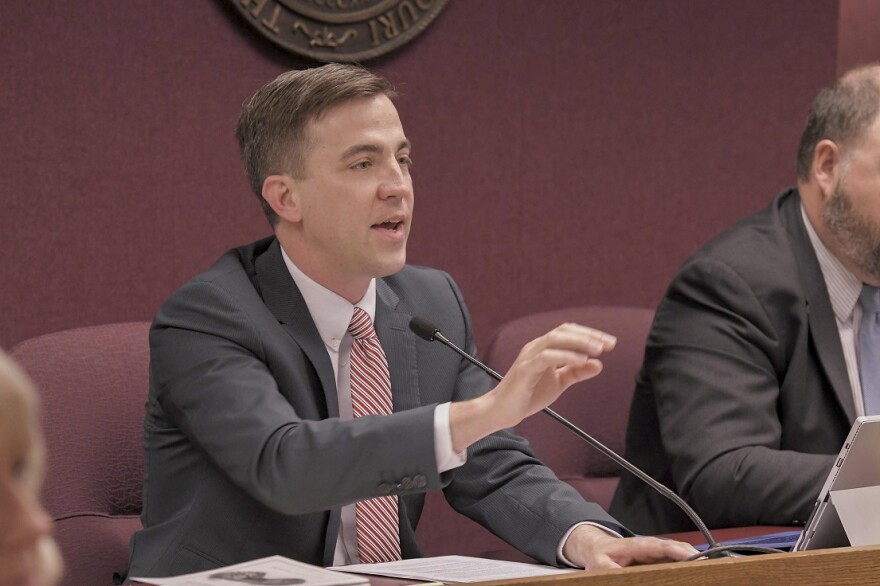The first open hearing of the Missouri House committee investigating Gov. Eric Greitens featured some heated exchanges between members and the governor’s attorneys.
Committee members heard from Ed Greim and Ross Garber, two attorneys hired by Greitens “in his capacity as governor.” They appeared before the committee Wednesday to propose several rules and a tentative schedule for the 30-day, special legislative session, which begins Friday at 6:30 p.m.
But the first hour of the hearing saw committee members peppering Greim and Garber with questions after they were placed under oath. Chairman Jay Barnes, R-Jefferson City, asked who hired them and to confirm how much the state is paying them. Greim said he’s billing the state $340 an hour, and Garber is billing the state $320 an hour, which he said is half his usual rate.
In addition, Barnes again invited Greitens himself to appear before the committee.
“If you want me to get down there and get on both knees and say ‘please, please, please, Mr. Garber, convince Mr. Greitens to testify,’ that’s what I’ll do,” he said. “We want to hear from him.”
His attorneys wouldn’t say whether the governor will testify, but Garber added that he was appreciative for the chance to talk about setting up rules “to get to the truth.”
Rep. Gina Mitten, D-St. Louis, wanted to know if the attorneys had discussed strategy with Greitens’ defense attorneys, or with Greitens for Missouri attorney Catherine Hanaway. Fellow Democrat Tommie Pierson Jr., of St. Louis asked if either attorney had ever represented non-profit groups associated with the governor, including A New Missouri.
Garber and Greim answered most questions, but occasionally cited attorney-client privilege. And they objected to being questioned about their hiring and about with whom they may have met.
“I asked for a meeting to talk about [the special session] process,” Greim said. “Now we come here, and instead of talking about process, we are actually being inquired of as witnesses in this matter for factual information – this is not the matter we came here to talk with you about.”

But Barnes said the line of questioning, particularly who’ve they talked to about Greitens’ legal troubles, is part of the process.
“To whom do we speak – who is our point of contact for [our] committee?” Barnes said. “Is it Mr. Greim, is it Mr. Garber, is it Mr. [Ed] Dowd, is it Mr. [Jim] Bennett, is it Mr. [Scott] Rosenbaum, is it Ms. Hanaway? This relates to process, guys.”
Greim, sounding frustrated, said he’s the point of contact if it regards Greitens in his official capacity as governor.
“We’re just trying to get off the ground with the rules that we’re suggesting for this committee,” Greim said. “Sworn questions under oath, respectfully, seem like a bizarre and unprecedented way to cover the preliminaries that really could have been covered over the past week.”
Barnes disagreed: “To be fair, we have received some answers, and we’ve received some ‘I don’t know’s.’ Committee members in the House get to ask questions.”
The questions continued after the two attorneys began discussing the ground rules and timetable the governor wants for the special session. It would include requiring all testimony from witnesses to be made in public, including the woman with whom Greitens had an affair, if she were called to testify again.
“As a general matter, yes,” Garber told reporters. “There should be public testimony, if it’s going to be relied upon, to potentially undo an election.”
The proposed ground rules would also grant subpoena power to the governor’s attorneys, and allow them to cross-examine witnesses. Greim said it would be “unprecedented” in Missouri to not allow cross-examination.
Barnes said, though, cross-examination of witnesses was not a part of Missouri’s last impeachment trial, which resulted in removing former Secretary of State Judith Moriarty from office in 1994.
Greim and Garber want the ground rules for the special session settled before it begins.
Follow Marshall on Twitter: @MarshallGReport





